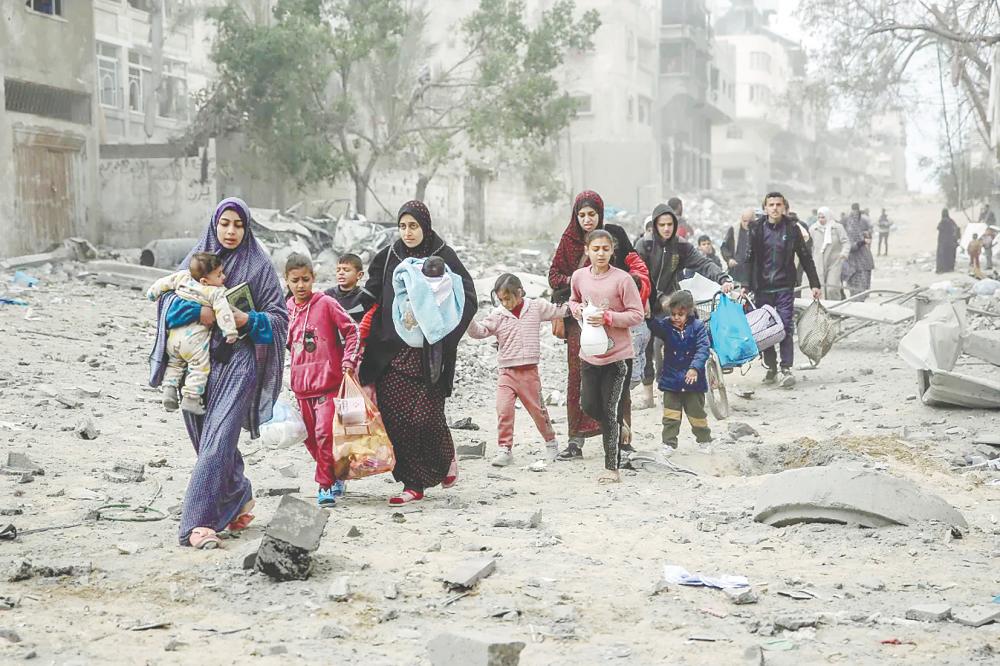In the intricate mosaic of human history, strewn with dark episodes of atrocities and oppression, the ongoing plight of Gaza emerges not merely as a distressing anomaly but as a profound echo of past horrors.
With its densely packed neighbourhoods and war-torn streets, this beleaguered strip of land hosts a contemporary tragedy under the watchful eyes of a world that has witnessed such spectacles before yet remains disturbingly silent.
Consider the BBC, Britain’s storied broadcaster, which is funded by the very public it often misleads.
As the skies over Gaza darken with the smoke of relentless bombing, the BBC’s narrative choreography sidesteps the term “genocide”, a critical evasion of responsibility that aligns it not with the impartial observer but squarely with the oppressor.
This isn’t a mere oversight. It is a deliberate obfuscation, mirroring the way the Turkish government long evaded acknowledging the grim reality of the Armenian genocide.
The BBC’s reluctance to label the systematic destruction in Gaza as genocide shapes public perception, crafting a narrative that obscures the aggressor’s actions under the guise of neutrality.
This pattern of historical echoes is harrowing.
The Palestinians in Gaza, akin to the Jews in Nazi Europe, the Tutsis in Rwanda and the Bosniaks in Srebrenica, are ensnared in a narrative that denies their suffering, questions their stories, and negates their pain.
The global vow of “never again” proclaimed after the Holocaust now seems a hollow promise as the world again witnesses the systematic dismantling of a people, hidden beneath the veneer of geopolitical conflict.
The siege of Gaza – a relentless blockade that both suffocates its inhabitants and isolates them from the world – mirrors the grim theatre of Sarajevo during the Bosnian War.
Sarajevo, too, was a city under siege, its desperate cries for help echoing through a world that watched but waited too long to act.
Gaza’s plight similarly encircled and cut off, unfolds in a slow-motion replay of that tragedy, with international attention flickering in and out, often arriving too late to prevent the next catastrophe.
Amid this backdrop of global apathy, UK charity group Disasters Emergency Committee attempts to pierce the veil of indifference.
Their struggle to broadcast a fundraising appeal for Gaza, thwarted by the BBC’s pretence of maintaining impartiality, echoes the broader pattern of international reluctance that has characterised responses to past genocides.
This recalls the 1930s, when Jewish refugees fled Nazi persecution only to find the world’s doors ominously closed, its collective heart tragically unyielding.
The role of the media in this modern saga reflects not its duty to inform but its function in shaping public perception to suit the narratives of the powerful.
Once heralded as guardians of truth, the media now too, often serve as enablers, softening the sharp edges of harsh realities to fit within the comfortable confines of political agendas.
This sanitisation and repackaging of human suffering into digestible news snippets mirror the minimisation seen in historical atrocities, from the Armenian genocide to the underreported Uighur camps in contemporary China.
As Gaza bleeds and burns, the cries rising from its ruins call not just for aid but for recognition, for the world to acknowledge the ongoing genocide for what it is and to call out the complicity of those who, by their silence, allow it to persist.
These cries cast a stark light on our collective moral failings, challenging us to respond not as bystanders but as bearers of responsibility.
The narrative of Gaza, woven with the threads of historical genocide and modern indifference, reveals not just the story of a region but of a world at a moral crossroads.
It compels us to confront the unsettling reflection in the mirror of our times: in the face of systemic eradication, silence is not just complicity it is active participation.
As Gaza’s tragic narrative unfolds, it serves as a litmus test for our global conscience, urging us to act, speak and remember lest we find ourselves not just witnessing history but repeating it, not as mere students of its lessons but as its repeat authors.
In this crucible of conflict, where the echoes of past atrocities mingle with the cries of the present, the international community must decide its role.
Will it remain a passive observer or will it intervene to alter the course of history?
The answer lies in our collective hands and as the shadows of past genocides loom large over Gaza, our response will not only shape the future of this beleaguered region but also define the essence of our humanity.
The writer is an entrepreneur with a passion for politics and international affairs. As a world traveller, his global experiences enhance his photography and literary work, providing unique insights and perspectives. Comments: letters@thesundaily.com









